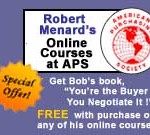Questions to Ask and Not to Ask in a Job Interview

Robert Menard, Certified Purchasing Professional, Certified Professional Purchasing Consultant, Certified Green Purchasing Professional
Editor’s note: Shortly after the webinar on the American Purchasing Society salary survey and how to negotiate a salary, a fine story on 10 Interview Questions You Should Never Ask (and 5 You Always Should) appeared in the Daily Muse. We commend this story to you. The following are some comments supporting this story.
Many purchasing pros are skilled in negotiation at their jobs but not so adept at negotiating on their own behalf. The reason is that buyers are selling when they are negotiating for jobs and salaries, a position with which many are uncomfortable. For example, purchasing pros are conversant with the Total Cost of Ownership it is easy to make a mistake when applying it to sales. The benefit package contributes to the TCO of a job position but should never be brought up by the interviewee until the interviewer broaches the subject. In sales parlance, one must always establish value before price.
The story points out tht questions beginning with ‘why” or “who” reveal that the interviewee has most likely not done the home work or research expected of a job applicant. This is straight forward good advice.
In a more subtle point, the story equates an offer of references by the interviewee too early in the process with desperation. Likening the interview to the dating process, the story cites, “It’s important to entice with your value and attract them to call you for the next date.”
On the subject of “Questions You Should Definitely Ask in a Job Interview” the author cites five piercing and cogent questions that will differentiae you from your competitors. In general, these are open ended questions. Most importantly, these questions take control of the interview and effectively transfers control to the interviewee. The interviewer delicately put into the position of selling the job opening to the candidate. The result tends to be a stronger effort by the potential employer, usually culminating in a higher offer.
I particularly liked Question 5, ”What are the Most Important Things You’d Like to See Me Accomplish in the First 30, 60 and 90 days of Employment?” This is known as the “presumptive sale”, much like the question of “cash or credit”?
Let me know if you agree.
